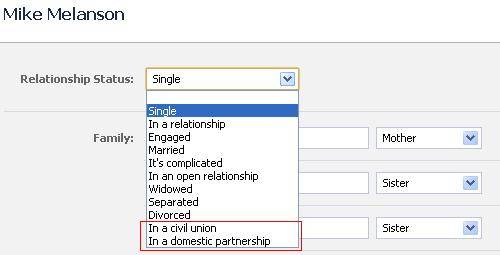
Sometimes, websites like Facebook or Google make the tiniest change and it makes headlines. This is one of those times. Today, 600 million member strong Facebook added two new options to its list of relationship status possibilities: “In a civil union” and “In a domestic partnership.”
It’s not that this change has wide-reaching effects in terms of usability or functionality, but rather that it is an acknowledgement and acceptance of newly adopted societal norms. It is a validation, by the site many people use to define themselves online, that same-sex marriages, civil unions and other non-traditional relationships have reached a level that deserve recognition.
The Huffington Post’s Bianca Bosker first noticed the change, writing that the new fields are being rolled out in the U.S. and several other countries, including Canada, France, the U.K., and Australia and were introduced “in consultation with Facebook’s Network of Support.”
We confirmed the new relationship statuses on our own accounts and took a screenshot of our own.

In some ways, it’s actually extremely surprising that it took Facebook this long. After all, civil unions and domestic partnerships have both been around for many years now and have even achieved legal status in a number of states and countries.
Of course, whenever something new is added, it immediately calls into question why other options aren’t available. Facebook-alternative Diaspora alluded to this when it made gender an open-ended text field rather than a multiple-choice question. Now that Facebook has gone a step further with its relationship options, how will it handle gender definitions? Will it remain binary or will it open up to more possibilities, as Diaspora did?
Facebook had this to say on the topic:
“This has been a highly requested feature from users. We want to provide options for people to genuinely and authentically reflect their relationships on Facebook.”
















